|
|
|
Sort Order |
|
|
|
Items / Page
|
|
|
|
|
|
|
| Srl | Item |
| 1 |
ID:
095455
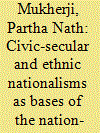

|
|
|
|
|
| Publication |
2010.
|
| Summary/Abstract |
The dominant Eurocentric paradigm of the nation and the nation-state was premised on western historical experience that was indigenous to the west but claimed universality for the rest. Many post-colonial countries, particularly those that went through national liberation struggles, like India and China, with multi-ethnic mobilisations, established sovereign states. The nationalist leaders claimed the unity of nationhood for their culturally diverse countries (states), with their millennia-deep civilisational identity, compelling a new discourse on the untenability of the classic Eurocentric paradigm. The second development witnessed the inevitable cultural heterogenisation of the western countries premised on the expansion of the (immigrant) labour market through an ever-enveloping regime of economic liberalisation and world trade. The catharsis of the invasion of cheaper labour from culturally diverse countries, often native-displacing, resulted in western countries attempting to accommodate the emerging changing reality in the context of mono-cultural nations through the concept and policy of multiculturalism. In spite of this, western countries have been witness to intercultural violence, racial discrimination and threats of home grown terrorism. The paper seeks to distinguish between 'pluralism' and 'multiculturalism' and argues for a reformulation of the concept of the nation-state that will have greater applicability across states.
|
|
|
|
|
|
|
|
|
|
|
|
|
|
|
|
| 2 |
ID:
117930
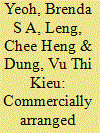

|
|
|
|
|
| Publication |
2013.
|
| Summary/Abstract |
Globalization and increased mobilities have multiplied cross-border transactions not only in the economic sphere but have also a major impact on human relationships of intimacy. This can be seen in the increased volume of differently mediated forms of international marriage, not just straddling 'east' and 'west', but within Asia and across different ethnicities and nationalities. International marriage raises a host of social issues for countries of origin and destination, including challenges relating to the citizenship status and rights of the marriage migrant. This paper examines the negotiation of citizenship rights in the case of commercially matched marriage migrants - namely Vietnamese women who marry Singaporean men and migrate to Singapore as 'foreign brides'. While they are folded into the 'family' - what is often thought of as the basic building block of the nation in Asian societies - they are not necessarily accorded full incorporation into the 'nation' despite Singapore's claims to multiculturalism. This is particularly salient at a point when cross-nationality, cross-ethnicity marriages between Singapore citizens and non-citizens are on the increase, accounting for over a third of marriages registered in Singapore in recent years. Vietnamese women who marry Singaporeans are positioned within the nation-state's citizenship regime as dependents of Singaporean men, having to rely on the legitimacy of the marriage relationship as well as the whims of their husbands in negotiating their rights vis-à-vis the Singapore state. Drawing on interviews and ethnographic work with 20 Vietnamese women who are commercially matched marriage migrants, the paper first focuses on the vulnerable positions these women find themselves, particularly given difficulties in forging their own support networks as well as weaknesses of the civil society sector in what has been called an 'illiberal democracy' characterized by a political culture of 'non-resistance'. The paper then goes on to examine the way they negotiate rights to residency/citizenship, work and children within webs of asymmetrical power relations within the family and the nation-state. We draw on our findings to show that citizenship is 'a terrain of struggle' within a multicultural nation-state shaped by social ideologies of gender, race and class and negotiated on an everyday basis within spheres of family intimacy.
|
|
|
|
|
|
|
|
|
|
|
|
|
|
|
|
| 3 |
ID:
117931
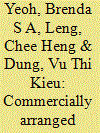

|
|
|
|
|
| Publication |
2013.
|
| Summary/Abstract |
Globalization and increased mobilities have multiplied cross-border transactions not only in the economic sphere but have also a major impact on human relationships of intimacy. This can be seen in the increased volume of differently mediated forms of international marriage, not just straddling 'east' and 'west', but within Asia and across different ethnicities and nationalities. International marriage raises a host of social issues for countries of origin and destination, including challenges relating to the citizenship status and rights of the marriage migrant. This paper examines the negotiation of citizenship rights in the case of commercially matched marriage migrants - namely Vietnamese women who marry Singaporean men and migrate to Singapore as 'foreign brides'. While they are folded into the 'family' - what is often thought of as the basic building block of the nation in Asian societies - they are not necessarily accorded full incorporation into the 'nation' despite Singapore's claims to multiculturalism. This is particularly salient at a point when cross-nationality, cross-ethnicity marriages between Singapore citizens and non-citizens are on the increase, accounting for over a third of marriages registered in Singapore in recent years. Vietnamese women who marry Singaporeans are positioned within the nation-state's citizenship regime as dependents of Singaporean men, having to rely on the legitimacy of the marriage relationship as well as the whims of their husbands in negotiating their rights vis-à-vis the Singapore state. Drawing on interviews and ethnographic work with 20 Vietnamese women who are commercially matched marriage migrants, the paper first focuses on the vulnerable positions these women find themselves, particularly given difficulties in forging their own support networks as well as weaknesses of the civil society sector in what has been called an 'illiberal democracy' characterized by a political culture of 'non-resistance'. The paper then goes on to examine the way they negotiate rights to residency/citizenship, work and children within webs of asymmetrical power relations within the family and the nation-state. We draw on our findings to show that citizenship is 'a terrain of struggle' within a multicultural nation-state shaped by social ideologies of gender, race and class and negotiated on an everyday basis within spheres of family intimacy.
|
|
|
|
|
|
|
|
|
|
|
|
|
|
|
|
| 4 |
ID:
005365
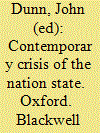

|
|
|
|
|
| Publication |
Oxford, Blackwell Publishers, 1995.
|
| Description |
v, 237p.
|
| Standard Number |
0631192638
|
|
|
|
|
|
|
|
|
|
|
|
Copies: C:1/I:0,R:0,Q:0
Circulation
| Accession# | Call# | Current Location | Status | Policy | Location |
| 036635 | 321.05/DUN 036635 | Main | On Shelf | General | |
|
|
|
|
| 5 |
ID:
006156


|
|
|
|
|
| Publication |
Cambridge, Polity Press, 1995.
|
| Description |
xii, 324p.
|
| Standard Number |
07456005675
|
|
|
|
|
|
|
|
|
|
|
|
Copies: C:1/I:0,R:0,Q:0
Circulation
| Accession# | Call# | Current Location | Status | Policy | Location |
| 037716 | 321.8/HEL 037716 | Main | On Shelf | General | |
|
|
|
|
| 6 |
ID:
001961
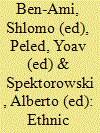

|
|
|
|
|
| Publication |
London, Macmillan, 2000.
|
| Description |
x, 340p.
|
| Standard Number |
3330792831
|
|
|
|
|
|
|
|
|
|
|
|
Copies: C:1/I:0,R:0,Q:0
Circulation
| Accession# | Call# | Current Location | Status | Policy | Location |
| 043054 | 320.54/BEN 043054 | Main | On Shelf | General | |
|
|
|
|
| 7 |
ID:
098848


|
|
|
|
|
| Publication |
2010.
|
| Summary/Abstract |
This article engages with the latest (post-Cold War) debate about the theory and practice of nation building (state building). This is linked to a discussion of the shift in US foreign policy towards Afghanistan relative to Iraq between late 2008 and late 2009. Afghanistan is currently a major focus of nation building efforts and counter-insurgency programs led by the United States of America. Meanwhile, the discussion here ranges from South Vietnam to Colombia, Iraq and Afghanistan, and explores some of the ghosts that now haunt the US presence in Afghanistan 9 years on from the start Operation Enduring Freedom at the end of 2001. We argue that the possibility of successful nation building in Afghanistan is both far-fetched and far-off. In fact, what is required is the reorientation and reduction (even termination) of Washington and its allies' direct commitment to Kabul. Washington and its allies should focus on a grand strategy for the Middle East and Asia that attaches far less importance to Afghanistan. This should occur in the context of understanding the history of the emergence, universalization and contemporary crisis of the nation-state system. Nowhere are the limits of the nation-state system and the failure of nation building more apparent today than in Afghanistan. In this context a whole new approach to questions of war, peace and progress is in order. The comprehensive elaboration of a new security-development framework is beyond the scope of this article, but we conclude by elaborating some of the main elements of a new framework: this will include a point of departure for research and policy to move beyond the current crisis of the nation-state system and nation building.
|
|
|
|
|
|
|
|
|
|
|
|
|
|
|
|
| 8 |
ID:
087281
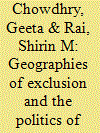

|
|
|
|
|
| Publication |
2009.
|
| Summary/Abstract |
In this essay, we argue that race has yet to be integrated as an analytical category shaping the study and teaching of international relations. We suggest that although the issues of race and gender are systematically coded into central concepts in the discipline, they are made invisible through a "series of ontological and epistemological maneuvers." Focusing on two concepts central to the discipline-sovereignty and the nation-state-we suggest that race can be better integrated into the teaching of international relations by focusing on the ways in which these maneuvers structure the geographies and politics of exclusion and inclusion in international relations. We conclude that raising questions about the ways in which race is taught in the academy is in itself critical-what we teach, how we teach, and who teaches are all questions that need repeated airing for achieving interpretative autonomy as well as a transformative politics.
|
|
|
|
|
|
|
|
|
|
|
|
|
|
|
|
| 9 |
ID:
085899


|
|
|
|
|
| Publication |
2009.
|
| Summary/Abstract |
This paper inquires as to how the internationalization of politics, society and the economy has affected the liberal-democratic foundations of European nation-states. 'Europeanization', the rise of global firms as powerful political actors, international migration within and towards Europe, international terrorism and organized crime as well as the state's responses to these challenges, and the surge of right-wing radicalism and populism are identified as the major forces that tend to put both the democratic and the liberal components of liberal democracies under pressure. Future research should devote more attention to studying the factors determining the extent to which different European countries are affected by the dynamics of internationalization and the relationship between different internationalization-related challenges. Moreover, politics as an academic discipline should be more ambitious about providing some normative guidance to coping with internationalization.
|
|
|
|
|
|
|
|
|
|
|
|
|
|
|
|
| 10 |
ID:
167196


|
|
|
|
|
| Summary/Abstract |
One hundred years ago, the first Department of International Politics was established at the University College of Wales, Aberystwyth, with the express purpose of seeking in Arnold Toynbee’s prophetic words (uttered many years later) – of breaking decisively with the ‘habit of nationalism’. As David Davies in the founding statement put it, by moving beyond ‘insular and vested prejudices … the shattered family of nations’ could be brought back together again and a new world order established. Yet as the history of the twentieth century showed – and the new century looks to be no nearer to realizing that original dream – nationalism has throughout continued to retain its power of mobilizing peoples and setting nation against nation. How and why this happened and with what consequences is the subject of this article.
|
|
|
|
|
|
|
|
|
|
|
|
|
|
|
|
| 11 |
ID:
006332


|
|
|
|
|
| Edition |
3rd ed.
|
| Publication |
Essex, Longman, 1994.
|
| Description |
xii,360p.
|
| Standard Number |
0582098629
|
|
|
|
|
|
|
|
|
|
|
|
Copies: C:1/I:0,R:0,Q:0
Circulation
| Accession# | Call# | Current Location | Status | Policy | Location |
| 038004 | 330/TAY 038004 | Main | On Shelf | General | |
|
|
|
|
| 12 |
ID:
185967
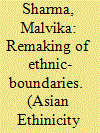

|
|
|
|
|
| Summary/Abstract |
Being an Ethnic-Pahari-Sikh-Borderlander in Poonch, Jammu and Kashmir is a phenomenon that adds to the discourse of ethnicity and nationalism. Partition of the Indian sub-continent in 1947 acted as a disruption in the socio-political history of the ethnic-community of Poonch generating difference and othering. This led to a newer set of challenges that re-imagines the concept of ethnicity altogether. Through an ethnographic account of the religiously assertive Sikh-identity in Poonch, this study asks the questions: Can the religious-reassertion of identities in a community render a concept as giant as ethnicity a myth? What happens to the historic origins of ethnic-bonds when identities begin to organise themselves exclusively on religious lines? Identities in Poonch exist at crossroads where being a religious Sikh challenge the idea of an ethno-geographic Sikh, both of them trying to co-exist under a bigger identity of being a borderlander.
|
|
|
|
|
|
|
|
|
|
|
|
|
|
|
|
| 13 |
ID:
092220


|
|
|
|
|
| Publication |
2009.
|
| Summary/Abstract |
How is it that the accumulating corpus of knowledge, deriving from two centuries of imperial involvement, has not proved a firmer foundation for modern political studies?1
Why-despite a rich body of work built up over more than a century by a number of eminent theorists-do the goings-on of Indian politics elude theorisation? Is the conceptual grid that provides intelligibility to the categories conventionally used to understand and theorise Indian politics-civil society, nation-state, democracy and citizenship-meaningful in the context of India's historical experience? If not, can it really be said that India's political experience constitutes an alternative model? This paper will argue that the root of the problem can be located in the failure of the systems of representation inherited from the colonialists and the Orientalists to relate meaningfully to the Indian context.
|
|
|
|
|
|
|
|
|
|
|
|
|
|
|
|
| 14 |
ID:
190806
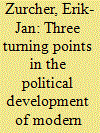

|
|
|
|
|
| Summary/Abstract |
This essay investigates the choices made by the Turkish political leadership at three crucial moments in the history of Turkey between World War I and the Cold War. It asks the question if viable alternatives to the chosen route were available, and to what extent the choices made reflected international developments of the time. The episodes looked at are the establishment of a nation-state and of a republic (two separate issues) in 1920–23, the turn towards authoritarianism during the World Crisis (1930–32) and the transition to multi-party democracy in 1945–50.
|
|
|
|
|
|
|
|
|
|
|
|
|
|
|
|
|
|
|
|
|